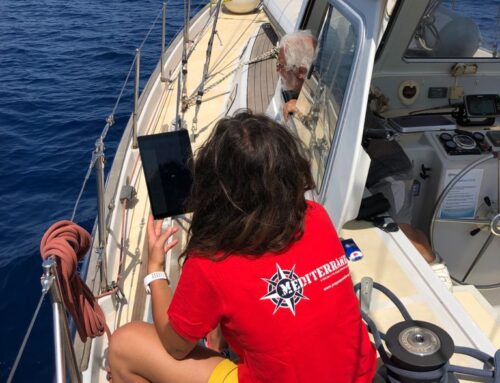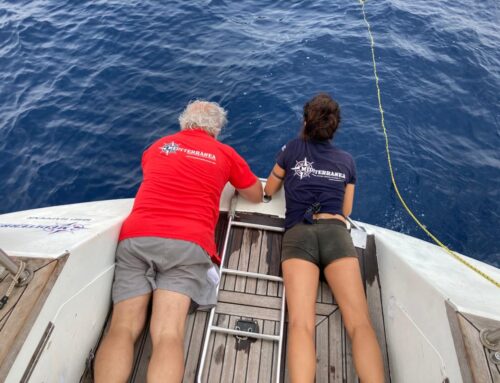
(by Simone Perotti)
“Turkey is a Mediterranean country!”. A completely different start from that of our interview with Serra Yilmaz. More contradictions, more opposite and controversial ipothesis. Our path to the knowledge of this portion of the Mediterranean is full of obstacles. My questions are answered by Vana Stellou, Greek, Instanbul correspondent for the second main Greek newspaper, who interviewed me a few days ago.
Swapping places is interesting, it offers further opportunities to understand. “Here they’re like us, just a bit better…”. How is that possible? Turks and Greeks hate each other, why such leniency? “It is not true. People get on well together, without problems. The strong powers collided, because the two countries have always had a strategic position with many foreign influences. But the truth is that I have been here for years now and have never had a single problem, I rather had a warm welcome, they call us the “Greek brothers”. Furthermore this is a Greek city, as it was Byzantium first and Constantinople later. It experienced diasporas, forced deportations, but the soul of Istanbul was and is Greek, at least one of its souls”. So the Turks same face even though not same race.
“Erdogan modernized the country. Kemalism had immobilized it, made it bureaucratic, suffocated by its own nationalism. None realizes what leading such a large country means, with 80 million people and ten years of economic crisis; it paid what it was due and it’s just started again in a big way”. And we are back to contradictions. We listened to hostile opinions on Erdogan, and now an explicitly favourable opinion. “There are problems of course, in particular that of the female condition because women, especially in the Eastern rural part of Turkey, are still at home, they have fear, there is too much permissiveness in domestic violence, in crime of passion. Yet this is not the only place in the world where that happens. Femicide occurs in Italy as well”, unfortunately she is right. “Erdogan is a very smart politician. He opened to the Kurdish minority as none did before. Today they might sort out their age-old dispute, and he is working on a resolution even with PKK. That way he obviously get votes from them too, not only from the religious Islamic world. Under kemalism Dervishes could not dance, none could practice his religion, who wanted to wear the veil either for tradition or belief was forbidden to in many public places. Even the beard was forbidden to public officers. Therefore, many people today welcome Erdogan’s opening as a sign of peacemaking and evolution towards equal dignity. That means votes, so no wonder his rising. The country is riven in two”.
That division in two, that multi-identity, that double or triple personality. Here I agree with Vana and see much in common with Greece. I ask her about Gezi Park. “It was not such a great protest, much more limited than the Greek Syntagma Square movement. How long did it last? Two, three months? It did not give rise to a front. The opposition is divided, weak and even inside each political party there are opposite souls in constant dispute. What is the alternative to Erdogan? And where is the youth movement? We should have mass movements when women are victims of violence as in the Özgecan case. But where is it? There are protests but nothing resounding, and everything is over”. Actually I witnessed many protests, always watched over by police forces, but nothing really impressive.
“The same applies to the ban on kissing in public, or to the government’s pressure on young couples not to live together before marriage. There are no mass demonstrations. In a city with 16 million inhabitants protests ought to be easy to mount, yet there is nothing as such. A protest was made to defend green areas which are so little in Istanbul. At least! But then?”.
I ask her whether the Turkish economic growth is real or just a legend to support enthusiasm and defend the government. “There is a strong growth. Lots of investments. The country is reliable. Erdogan cancelled bureaucracy, you can open a shop in five days here. However there are many debit cards, here people spend money they have not, and that might be risky. Speaking of an economic miracle would be exaggerated, but as against the previous immobilism it seems we are flying”.
I let her talk, I don’t dispute her, I want her to express her opinion without being heckled or contradicted. I want to listen. Since I arrived here all my western convictions have been challenged. Here everything is complicated to understand, it is not easy at all to come to a judgment. For example, I ask her of the danger of a conservative drift. “That is also a legend. There is no such danger. What does the city look like to you? Free? Do you have any problem here? Can you walk around freely, does anyone disturb you? Well, I wear miniskirts (editor’s note: she is actually wearing a very short one) and have never had any problems for that. Quite the opposite, women wearing veils in my block knock on my door to ask if everything is all right when they don’t see me for three or four days. We are friend and none would dare to criticize. Everyone does what pleases him or her. And if a woman wants to wear the veil she can now. The Western world misunderstood between the right and the duty to wear the veil. Everything changes if you think about it”.
But what about repressive laws, the role of the police and the army? “Well, for the first time military leaders were imprisoned as involved in some scandals. Shall we consider it a negative result? I consider it positive instead. As for laws to control the situation I would just report a rumour: in 2013 in the USA Erdogan had very difficult exchanges with Obama. All the items on their agenda were discussed in very arduous days. In a picture at the end of their meetings Erdogan appeared very stiff and distant. On his face you could read there had been no understanding with the US President. Then, Erdogan was still on his flight from Washington to Istanbul when Gezi Park protests broke out. Do you think it was by chance?”.
We stop here. I hadn’t heard such a clear and firm stance on the Turkish situation before. We will have to intertwine it to many other voices. Above all, it will need to be thought about with great open-mindedness.





Leave A Comment